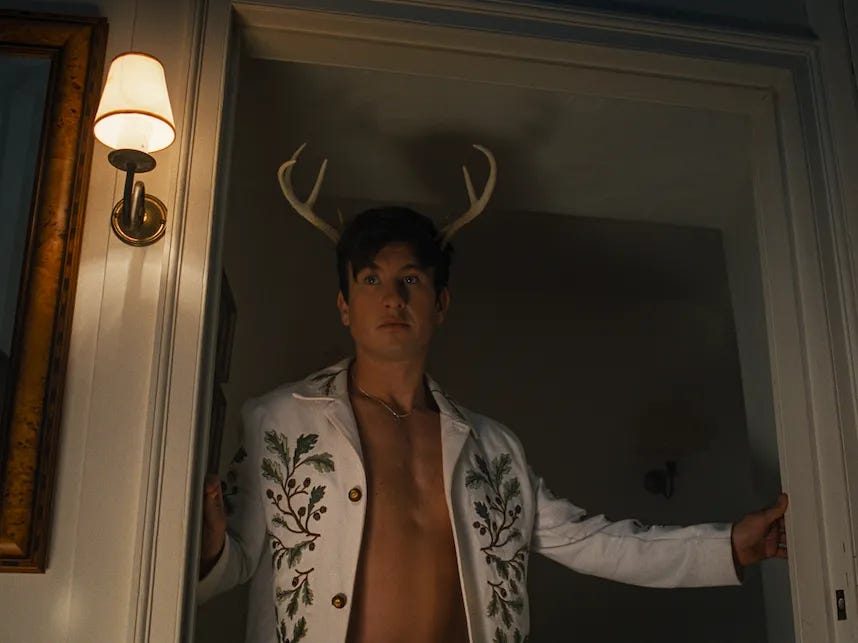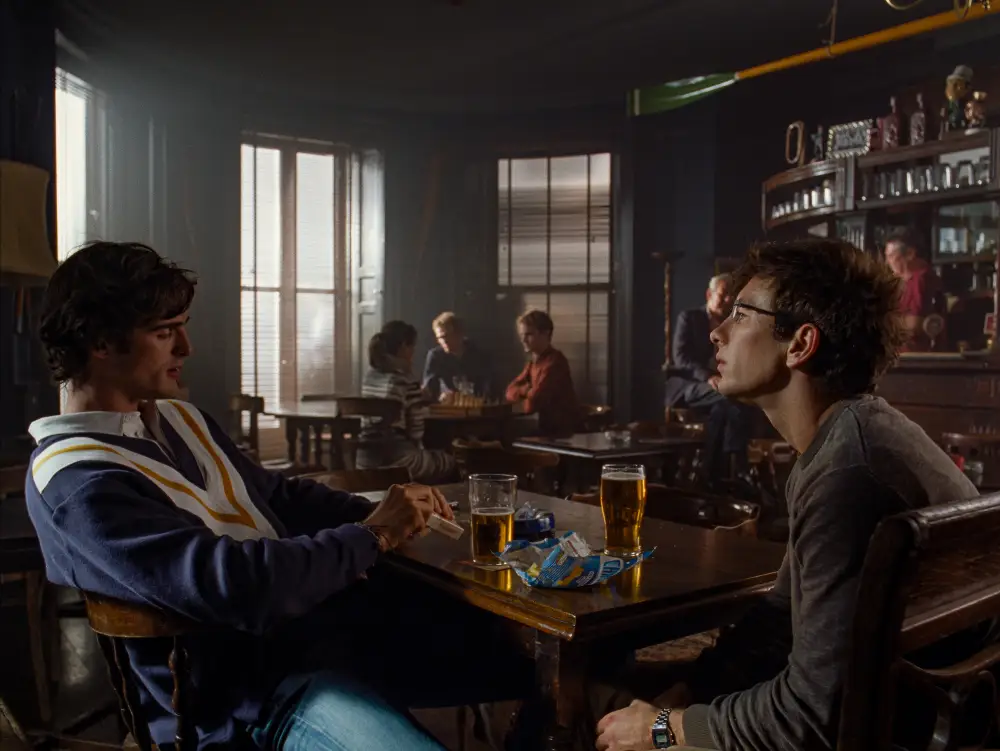From the moment I saw the first images from Saltburn directed by Emerald Fennell, I knew I would probably write about it in some larger connection to Dark Academia. Then the movie came out and I quickly realized I would hate it. And yet, here we are—a few pleas from my friends to talk about it and one two-star watch later. This is not a review. Saltburn is obsessed with beauty, but its aesthetic is an empty vehicle.
I feel uniquely qualified to talk about Dark Academia. I have a bit of an insatiable fascination with the genre. Each time a Dark Academia book’s plot is postured to me, I find myself compelled enough to read it. As of typing this, I’ve read the 5 of arguably most popular Dark Academia novels (The Secret History, If We Were Villains, Babel, Ninth House, and The Atlas Six). I have read books that I consider to be dark academia but are less popular (Vita Nostra, The Amber Spyglass) and books that often are part of the conversation but I do not think are dark academia (Vicious, The Invisible Life of Addie LaRue, Never Let Me Go, The Goldfinch). I wish I could say I enjoyed them as much as they were enjoyed by the people who recommended them to me. But my taste aside, be assured, I understand this genre deeply.
But to understand Dark Academia, first, we must begin with Harry Potter. (I’m sorry.)
Though many now can’t help but associate Harry Potter with the vile and bigoted views of its transphobic author, the 2000s were dominated by Harry Potter as a cultural icon. The seven-book series focuses on a young wizard as he navigates magical schooling in a castle under a looming threat from a dangerous dark lord who attempted to kill him as a child. Hordes of children waited on their 11th birthday for their letter from Hogwarts, secretly hoping that they too were wizards. They dreamed of perambulating through ancient halls into ivy-coated courtyards, of studying well worn cloth or leatherbound books. We did not know it at the time, but Hogwarts became an ideal, an aesthetic, that seeded its way into the minds of young children everywhere, and those children have grown up.
I thought I was so clever when I made the Harry Potter to Dark Academia connection. In fact, I was on the phone with my friend, who then quickly pointed out that she made the same observation a year ago, and I just forgot. Well, joke’s on both of us, because apparently, anyone who has been on the internet long enough to study the blade (tumblr) could make the connection. It’s even on the Dark Academia wikipedia page, sourced from this article, something I just googled so I could write this.

But still, what is dark academia? Per Wikipedia, it’s “an internet aesthetic and subculture concerned with higher education, the arts, and literature, or an idealised version thereof. The aesthetic centres on traditional educational clothing, interior design, activities such as writing and poetry, ancient art, and classic literature, as well as classical Greek and Collegiate Gothic architecture.” But also trust me, it’s a genre. It’s supposed to be about books that are thematically intertwined with academia– about an established college or institution in some way and usually, there’s a murder or something to make it dark. Many pretend that Dark Academia is meant to comment on the state of academia itself, and the violence in the novel must intertwine with such themes, but thematics have always taken a backseat to aesthetics and they always will. It’s all about the Aesthetic.
And yes, I do think that Saltburn fits within the heavily curated dark academia aesthetic. It opens at Oxford and you see them study a little bit. The bulk of the film takes place on an estate overlaid with the perfect Dark Academia interior. The movie is named after the house, the film ends with an indulgent tour of the house, the house is a character and a symbol as much as it is a setting. It’s kind of gay through a one-sided homoerotic friendship. There’s murder. These are symptoms of Dark Academia. It is no coincidence that this movie has become popular with the late-gen z/early millennial crowd, the demographic most familiar with Dark Academia. Also, the characters are reading Harry Potter throughout the film, which must count for something, though there is another book that must be considered in this conversation.

The Secret History by Donna Tartt is perhaps the original it-girl of dark academia. Many of the popular Dark Academia books that have succeeded it seem like pale imitations (If We Were Villains by ML Rio) or are direct responses (Babel by R.F. Kuang). The Secret History is compared, from time to time, to Bridehead Revisited by Evelyn Waugh, perhaps most infamously on a podcast claiming that the novel was heavily inspired by Tartt’s time at Bennington College, an institution apparently culturally influenced by Brideshead.
Going into Saltburn, Jacob Elordi, who plays Felix, mentioned that he read Brideshead Revisited to prepare for the role. I expected some overlap. I did not expect Evelyn Waugh himself to be name-dropped in the film. I did expect that, having read the book, it would give me a better cultural or thematic context for what the film was trying to accomplish. Mostly, it did not. Also, I assumed that the film would be, like, kind of gay. Because Brideshead is kind of gay, and, well, all Dark Academia is kind of gay.
I attribute the association of homosexuality (specifically between two men) and Dark Academia to two sources. First, of course, The Secret History is a little bit gay (well, it is gay, but probably not how you’re anticipating). Second, Harry Potter. It is no coincidence that the rise of Dark Academia has come in tandem with a newly reinvigorated love for Harry Potter fanfiction. All the Young Dudes and its Consequences (derogatory).
Is Saltburn gay? Yes. But it doesn’t matter. Just like wealth or class or anything does not matter in that movie. It’s a vapid display of empty aesthetics, the ultimate dark academia creation.
Saltburn is about an Oxford scholarship student, Oliver Quick (Barry Keogan), as he forms a friendship with the wealthy Felix Catton (Jacob Elordi). With no other friends, Oliver quickly becomes enamored by him and shares details of his poverty-stricken background. After the death of Oliver’s father, Felix invites him to stay the summer at his estate, Saltburn. Oliver accepts the invitation, spending time with Felix’s eclectic family, until Oliver’s happiness begins to unravel at the seams.
Now, I will spoil the movie. We must if we want to get to the bottom of things.
First of all, Oliver ends up murdering the entire family and inherits the house, the titular Saltburn. Usually, the point of the movie would be the why but we don’t get much of an explanation. We know that Oliver loved Felix, but also hated him. He hated all of them. But also loved them. This could mean anything, but luckily, we have the trusted tools of media literacy on our side. (I have seen so many people misinterpret this movie with such gobbledygook analysis that I have little faith in determining a clear answer.)
Saltburn is not about class in the slightest. Oliver is regularly made fun of for wearing cheap clothes, mocked and belittled for not being able to pay for things, and tortured by Felix’s cousin with the reminder that he’s a charity case. We later find out that Oliver is not actually poor at all, and it was part of a ruse to get Felix to like him. The rich in this movie are depicted as cold and self-absorbed in passing, but this never manifests in anything truly heinous, unlike Oliver’s actions. They might treat the less fortunate as disposable, but Oliver is right to be afraid about his status in Saltburn because he is an outsider. He’s a psychopath manipulating them all from the start.
So what does Oliver desire? It could be a yearning for a feeling of belonging (after Oliver kills Felix’s mother, he forces her hands around him in an embrace), but that’s not right. Oliver’s concerns about fitting in were always second to his obsession with Felix. But what is his obsession with Felix? Is it that he is kind? Is it that he is social? Is that it is because he makes Oliver feel good?
Honestly, I believe his obsession is entirely aesthetically driven. It is because Felix is beautiful.
At the end of the film, it is revealed that Oliver orchestrated the entire plot from their first meeting onwards. He was obsessed with Felix, relishing in this plan, before he had said one word to him. We could attribute this to lust, with desire for Felix, which is present, but ultimately, Felix is long dead by the time the plot resolves when Oliver possesses the Saltburn.
Felix is the first person Oliver kills and the one he truly desires. Oliver’s desire to possess the house comes from his failure to be able to possess Felix. Saltburn and Felix are heavily linked together, with the introduction to the house centering Felix in the frame rather than anything the house has to offer. While Felix and the house represent the same thing to Oliver, an argument must be made for why this same thing is beauty.
Felix claims Evelyn Waugh was obsessed with Saltburn. In Brideshead Revisited, the Brideshead Castle, and by extension Saltburn, represents many numbers of things, most of which aren’t meaningfully interfaced with in this movie, except its enduring beauty. Brideshead is so beautiful and captivating that the main character feels compelled to capture it, and it is part of the reason that he becomes an architectural painter. In Saltburn, Felix’s mother has an obsession with beauty, both for herself and everyone in her vicinity. Saltburn is an extension of that beauty, carefully curated and meticulously preserved.
Next. The Minotaur.
Many try to attribute the Minotaur symbolism in Saltburn to his place in mythology as the slain beast by the hero Theseus, but that trail of thought quickly becomes convoluted. It is difficult to argue that the minotaur is a symbol of helplessness, victimhood, or privilege, all themes the movie attempts to convince you it is interfacing with. Fennell claims the symbolism is about “the prey that becomes predator”, the boy dressed in deer antlers who resembles the beast at the center of the labyrinth. Whatever that means.
Oliver is not molded through the events of the film into becoming a predator. He is born one. A more cohesive argument would be of the minotaur as a symbol of the corruption of desire.

The legend tells that Minos, ruler of Crete, asked for a bull from Poseidon to prove his favor. He got his bull, and was meant to sacrifice him, but could not bear to because the bull was so beautiful. Poseidon didn’t like that, and as retaliation, made Minos’s wife fall in love with the bull and bear a half-bull child, the Minotaur. The Minotaur, an abomination and beast, grew violent and bloodthirsty. To keep the Minotaur locked away, the ruler of Crete asked Daedalus, an inventor to create a maze to place the beast inside.

In Saltburn, there’s a maze. At the center of the maze, there’s a statue of a minotaur. That’s where Oliver kills Felix, while he is wearing deer antlers in a similar fashion to the minotaur’s horns and Felix is wearing wings in a similar fashion to how Daedalus would eventually craft wax wings to escape Crete. There is no Theseus here. There is no hero. There is the man who crafted the maze, thinking it would keep him safe, and there is the minotaur, the violent consequence resulting from the corruption of desire, an obsession with beauty.
It could also be argued that Felix’s wings are a reference to Daedalus’s son, Icarus, who is known in mythology as the boy who naively tested the limits of his freedom, who flew too close to the sun until the wax from his wings melted and he plummeted to his death. But such an analogy means nothing in the context of the film. Such Grecian myths are vessels for lessons, in Icarus’s case, to be cautious. But what was Felix’s crime? How does he embody a cautionary tale?
Felix can be cold, and he can use people, but these were not his sins. Yes, he would eventually dispose of Oliver, like he used and disposed of all his friends before Oliver, but the entire movie is recontextualized so that Oliver had planned to befriend and destroy him before they had ever met, and so Felix’s fault was falling for Oliver’s ruse. His ultimate sin was to show kindness to someone whom he thought was a friend, his kindness to Oliver being the catalyst for his demise. And so, any comparison to Icarus or Daedalus is an empty symbol, a meaningless allusion.
All of Saltburn, front to back, is utterly vapid and extremely boring.
You may think it cruel of me to whittle down something as complex as desire to an aesthetic beauty, but Fennell did that herself. She removed all thematics from the film, anything meaningful about class or gender or sexuality. In her film, beauty is simply beauty.
She erects beautiful images and alludes to symbols and promises the audience that they mean something, only for them to be hollow approximations of anything real. The audience slowly realizes that all motivations thus far mean nothing, almost to an infuriatingly stupid degree. They are lead to believe that the movie would be about class, and she subverts this idea, but does not replace it with another. Desire, love, hate mean nothing to Oliver. It means nothing to the viewer. It is not afforded context or reflection and is instead used as a weak motivation. What hole in himself is Oliver attempting to patch with Felix’s love? What about this desire corrupted him so? We have no answers to any of this, and have no choice but to attribute it all to the aesthetic.

Felix’s family’s, especially his mother’s, acceptance of Oliver means nothing, so he does not seek acceptance. He does not care about maintaining friendships outside of Felix’s, so it is not social affability. He resents going to high-class functions, so it is not class. He is raised middle class and has enough money to get by, so it is not money. And it is not high-class finery, because while he shows appreciation in passing (more of a Chekov’s gun than anything else), it never seems like anything he has an interest in possessing. He’s only concerned with Felix.
Oliver lies to his family, making himself to be a better scholar and athlete than he is, so he is driven by a desire to feel important. But when Felix’s cousin mocks him, telling him that this house and this summer will only ever be a story to tell his children, it is not rooted in anything specifically important to Oliver. Oliver is disinterested in the prestige that comes with the house and is only concerned with maintaining his spot there next to Felix.
At the end of the film, Oliver gains possession of the house as a final middle finger, proof that the house will not become a story to him, but Felix had been dead for 15 years at that point. It’s all worthless. Not in the, “oh, the tragedy of the situation” type of way, but truly, the film is not saying anything meaningful about human desire. It’s just about some crazy guy.
May December was another 2023 release in which there was a subversion about the seemingly complex motivations of a depraved character. The film follows an actress as she researches a woman she is meant to be playing. The movie within the movie is based on how the woman groomed a thirteen-year-old boy and the actress is attempting to peel back the complexities of the situation because, well, the woman is now married to the then-boy now-man she groomed, so there must be more to it. Except there isn’t. As the film goes on, the audience finds that the woman is simply crazy, there is no complexity behind it, and she is delusional and manipulative.
The subversion in May December means something within the narrative. It amplifies the tragedy as her victim comes to terms with how she stole his life, not for love, but for nothing. It causes the viewer to question their motivations with the film, and why they expected anything more to the story, as they watch how the actress sensationalizes the tale, spinning it into whatever she wants with no regard for the simple truth of the matter. It’s a reflection of how audiences consume such stories, our carnal desire to find something thrilling in the straightforward and tragic.
There is no such narrative purpose in Saltburn. The themes about class and wealth are not turned on their head, they are discarded. At the beginning of the movie, you’re meant to think that Oliver is Felix’s toy, and by the end of it, it’s revealed that Felix is actually Oliver’s toy. But while Felix’s possession of Oliver could be a commentary on how the upper class commodifies and controls their relationships, Oliver’s possession of Felix means… well… that he’s crazy. He’s not getting revenge. He’s not getting his licks in. He was crazy to begin with, from day one.

He’s crazy. Wild! Can you believe he killed all those rich people and possessed their belongings because he could not possess them!? Wow. That sounds cool to say, so I’m sure it means something. I’m sure it does. There are all these cool shots and symbols scattered throughout the movie. I’m sure it all means something. I’m sure. He killed Felix because he could not keep him. Because he killed Felix, he was driven to insanity and killed everyone else. Or maybe he was insane from the start! What a twist! Oliver loves Felix. Doesn’t that mean anything? He hates him. That should mean something.
Or maybe they’re just empty motivations, moving forward pieces on a chessboard towards mildly depraved scenes so we can continue to pretend that any of it has thematic value. Truly, this is Dark Academia through and through, much more concerned with idealization, an aesthetic, and a vibe than saying anything of thematic importance.

[…] that’s not entirely true. I did release a blog post in January about Saltburn. And then after that, I had to study really intensively for an exam. After I passed in March, I […]
LikeLike